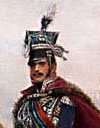Moving the chess pieces...
Who is really watching the board?
According to army times:
Beginning Oct. 1 for 12 months, the 1st BCT will be under the day-to-day control of U.S. Army North, the Army service component of Northern Command, as an on-call federal response force for natural or manmade emergencies and disasters, including terrorist attacks.
Some other blogs are speaking out about this:
Infoshop News
digitaljournal.com
Common Dreams
The sad part about all of this is I have written, in other places, about all this before.
I see the current President, one G.W. Bush as a re-incarnation of Lucius Cornelius Sulla, the one whom did 'take power' in Rome in the year 88 BCE.
If there is one thing that I have found true about many of the tabletop game players, especially the ones that play historical games; it is that they do have a 'grasp of history'. Perhaps greater than the grasp of so many of our contemporaries, whom do not see the understanding of history as of any great value, nor of intricate study of these men and women of the past.
One thing to consider when looking at events like those unfolding around us now...did the average Roman citizen in 458 CE really understand why the capitol had been moved to Revenna, and who Odacer really was? Did the average man in the street in Brundisium have a concept that the Roman Empire was dead?
I think not.
There was an "Emperor" Charlemagne in 800 CE.
Only in 1806 did the "Holy Roman Empire" finally end, when a Corsican bandit demanded that the "Emperor" Francis II lose his title to it.
Has a new piece begun to move now on our 'real life' board?
Are we even noticing it?
Friday, October 10, 2008
Subscribe to:
Post Comments (Atom)






















































3 comments:
Even if one were to accept your analogy, and posit, in the spirit of Spengler's "Age of Caesars," that the leaders assassinated in the late '60s were modern Gracchi, the fact remains that Marius, the populist dictator preceded Sulla, the champion of the optimates.
The first coup is always in the name "of the people" before the reaction in the name of "law and order."
I would like to (respectfully and tactfully) disagree with the premise that the assignment of the BCT is the move of a chess piece. Given my experience (26 years on active duty, two years on the personal staff of the commander of FORSCOM that commands these guys) I think that what you are seeing is the recognition that these guys have been doing this for a while and so should be given the task as a formal mission to train for. Even in the early 90s when I was at FORSCOM, there were weekly uses of regular and NG/Reserve forces for civil duties using approved processes that did not violate the limitations on their use in the US. I think that there is some concern that the Guard may have units deployed when a mission for them results and the regulars have to step in and replace them. There was a great deal of regular army support during Katrina at various levels.
Thank you miniwargamer for your thoughts.
The Canadian Forces are always ready to take action in 'aid to civil power' role. When employed in such a manner they are not to take over policing functions, nor are they really trained to do this.
When used, in Canada, in a function other than digging, building, driving, or other helpful actions such as those taken in Winnipeg during a large flood or in central Quebec during an ice storm (actually after the storm during clean-up), there must be a declaration of the need for 'force majeur' or 'martial law', called in Canada: the war measures act; which since amendment in 1988 is called the Emergencies Act. This later document, along with the war measures act both involve the police in their actions. The later Emergencies Act retains civil rights, even during the emergency.
In Canada this has only been done in modern memory during the FLQ crisis when British Trade Commissioner James Cross was kidnapped in October of 1970. The military presence was restricted to Ottawa, with some transportation support to the Quebec police and the RCMP. Their actions were limited and at all times under the control of civil police and parliamentary authority.
When the CF was used in a police role in Somalia, there were significant errors made, ending with the disbandment of a unit, the ending of two senior officers careers and the resignation of a Minister of Defence (the rough equivalent to Secretary of Defence).
My point here is that whenever combat focus troops are deployed in a policing role there are going to be major lapses in judgement, since these combat troops are not specifically trained in 'escalation of force' techniques, nor in any non-violent response.
1 BCT is a combat force, recently involved in very intense and focused combat operations, not unlike the Canadian Airborne that were used in Somalia with such disastrous consequences.
Battle troops are never to be used in a policing role so soon after combat operations. There are always going to be lapses in judgement due to the stress of combat. Always.
The other chilling part of the article from Army Times is this little quote:
After 1st BCT finishes its dwell-time mission, expectations are that another, as yet unnamed, active-duty brigade will take over and that the mission will be a permanent one.
...a permanent one.
PERMANENT
If this is not the first move across the modern Rubicon, then I know not what impediment there is to modern empire.
Post a Comment